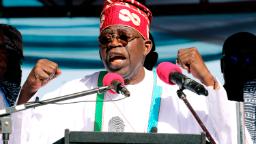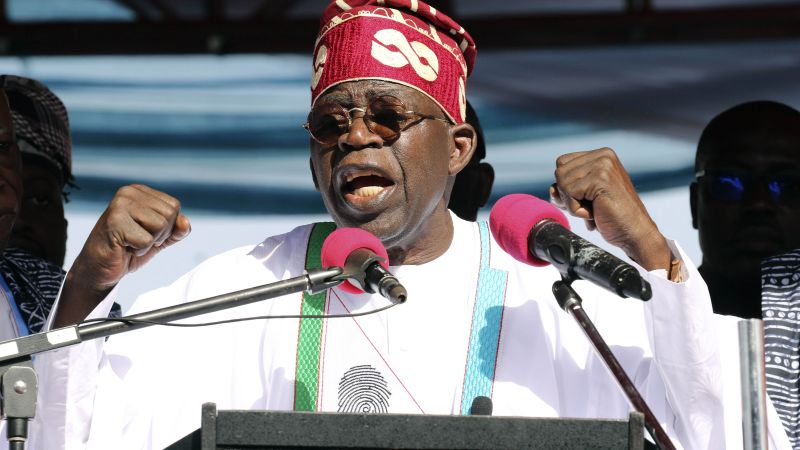Who is Nigeria’s new President-elect Bola Tinubu? | CNN

Abuja, Nigeria
CNN
—
Bola Ahmed Tinubu has emerged the winner of a closely fought contest for Nigeria’s presidency. But who is the man who will lead Africa’s largest economy – as well as inherit its plethora of economic and security crises?
Tinubu, who turns 71 later this month, was governor in Lagos between 1999 and 2007, where he is credited with pioneering reforms that led to transformation of the state, now Nigeria’s economic hub.
He will become Nigeria’s fifth president since the country returned to democratic rule in 1999, emerging as winner for the country’s top job on his first attempt.
However, opposition parties have rejected the results and say they will challenge it in court. The election was marred by reports of voter suppression, and outbreaks of violence, particularly in Tinubu’s stronghold Lagos. Voters also faced lengthy delays and some election officials failed to turn up to polling stations.
Tinubu has gone from grass to grace after a rocky start. He left Nigeria for the US to study in Chicago and was sometimes forced to wash dishes to make ends meet, according to the Bola Tinubu library.
Upon returning to Nigeria, Tinubu worked in the oil sector before venturing into politics. He was elected into the Nigerian senate in 1992 and served until the next year when the military seized power. He fled the country in 1994 after the pro-democracy group he co-founded failed to sway the military to relinquish power.
Known as ‘Jagaban’ – ‘warrior of warriors’ – by his followers, Tinubu has shackles emblazoned on his trademark woven caps, to symbolize a time he lost his freedom when he was forced into exile by the dictator Sani Abacha.
He returned to Nigeria after four years and was successful in his bid for the top job in Lagos following Nigeria’s return to democracy in 1999.
Tinubu was dogged by allegations of corruption throughout the campaign trail which he strongly denies. Tinubu is enormously wealthy and he has interests in many sectors including real estate and media.
He once had a bullion van at his home in an affluent area of Lagos during the 2019 elections. “I keep money wherever I want,” Tinubu said in response.
Critics say he did not convincingly address concerns about his health, and, at times, appeared confused and incoherent on the campaign trail. He also made gaffes that have made him the butt of jokes and viral memes on social media.
Tinubu was also criticized for abstaining from presidential debates and delegating questions about his manifesto to members of his team during a recent outing at the UK think tank Chatham House.
A practicing Muslim like his predecessor, Muhammadu Buhari, Tinubu has six children and is married to Oluremi Tinubu, a senator in Lagos.
During his acceptance speech, Tinubu joked that his wife would no longer be heading back to the senate as she would now be his “housewife and First Lady.” It was a joke that has not gone down with many Nigerian women, who still struggle to gain foothold in politics.
Now he has to get on with the serious task of uniting a country fractured along religious, ethnic and generational lines as well as a host of problems including insecurity, an economy on the brink of collapse, as well as fuel, cash and power shortages.
He will also have to work hard to shake off the association with the ruling party, under which many Nigerians have suffered untold hardships.
“I am not the party,” he said during the campaign. “My track record should speak for me.”
His supporters call Tinubu a master strategist and ‘king of the long game’ who has been planning his ascent to the throne for years.
“He didn’t just become a governor of a major state like Lagos, he also built a succession plan. He used his clout and enormous resources to build leaders and establish political influence, first in the southwest … and then extended to the north of Nigeria,” says Nigerian political analyst Sam Amadi.
Tinubu wields significant influence in the southwest where he is seen as a political godfather and kingmaker. He has handpicked every Lagos governor since since leaving office in 2007 and was instrumental in the election of Buhari to the presidency on his fourth attempt in 2015.
After decades as a political puppet master, Tinubu declared it was now his turn to emerge from the shadows into the presidency; his campaign slogan was “Emi Lokan,” which translates to “it is my turn,” in his native Yoruba language.
Tinubu was essentially calling in the favor with the slogan, explains Amadi.
“Nigerian politics is an arrangement, it’s turn by turn…. Buhari could get all the votes in the north but he couldn’t get two-third majority of votes anywhere in the south, and Tinubu turned the southwest to him. This tells us that there’s a sense in which Nigerian politicians feel that access to power is an entitlement … what they think they deserve because of investment of finance or investment of goodwill that they’ve put into the system,” Amadi said.
For all the latest world News Click Here

